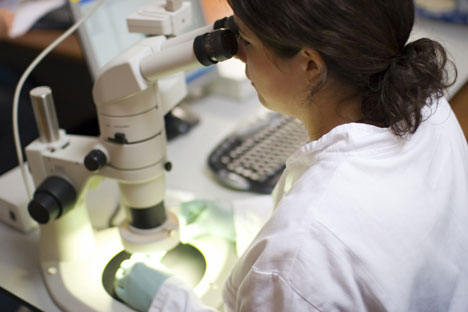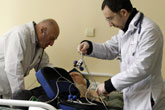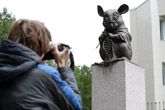Startup offers Russians affordable genome testing

Russian scientists developed genetic research packages. These are capable of identifying risks of specific conditions, such as a stroke or diabetes. Source: PhotoXPress
Inspired by the story of Anne Voyzhitsky (the wife of one of the founders of Google, Sergei Brin), Moscow State University graduates Valery Ilinsky and Artem Yelmuratov decided to sell human genome sequencing in Russia. Voyzhitsky’s company, 23andMe, occupies this niche confidently in America.
Russian laboratories are only able to offer the PCR-test, which gives a patient a “yes” or “no” answer to whether they are susceptible to a specific illness. Ilinsky and Yelmuratov are offering a human genome sequencing service — that is to say, a service that provides a complete genetic “portrait” of an individual.
In the end, the client will receive information concerning their susceptibilities to all illnesses known to modern science.
The Ministry of Health in Russia classifies these tests as scientific activity, while genetic testing is already a highly profitable business in the United States. However, localization of the Western model proved difficult, as genetic tests were very expensive: Full genome sequencing, which allows those who so desire to see their complete genetic portrait, compares in price to a Swiss watch.
In order to reduce the price, the founders of Genotech developed genetic research packages. These are capable of identifying risks of specific conditions, such as a stroke or diabetes.
In addition, they reached an agreement about discounts with their equipment suppliers, under which Genotech places orders for DNA analysis equipment at an optimum price. The entrepreneurs also developed special software to process the genome statistics.
Genotech defined its core audience as wealthy Russians who are prepared to pay to find out if they are predisposed to a particular sport, for example, or their memory capacity. After fine-tuning the technology (which cost them more than $1,500,000 of their own money), the entrepreneurs decided to concentrate on marketing, again following the Western format.
“In 2010, Go-fac-tor Genomics analyzed Ozzie Osbourne’s genome, which sparked a real boom,” said Yelmuratov. “It turns out that, for example, the legendary musician is able to tolerate alcohol easily, and many of his genes are consistent with those of a Neanderthal. We also decided to offer tests for the stars, in the hope that this would ignite market growth.”
Russian celebrities were offered the chance to take the test for free, although, according to Ilinsky, American companies were charging not less than $1,500 for full genetic sequencing during a share promotion.
Related
Siberian scientists test G5 anti-aging pills
Innovation by Russian scientists will help ease cancer treatment
The entrepreneurs began to look for famous people via acquaintances and at events for investors. Of the list of 100 celebrities that Yelmuratov and Ilinsky composed, only five agreed to have their genome sequenced.
They turned out to be leaders in the venture capitalist market. “We understood that our aim was a high net-worth target audience, and businessmen and entrepreneurs on the startup market are only a small part of this, but we decided to try.”
The Genotech venture capitalist investors offered the My Genome research package, which reveals 120 susceptibilities to diseases and 14 interesting details about an individual’s genome. The former spy and current Venture Business News innovations editor, Anna Chapman, took the test.
The heads of the business incubator at Moscow State University, the managing founder of the venture fund Almaz Capital Partners, and the director of Almaz’s Moscow office also took the test. Some of those who did not wish to be named considered offering this new service to their friends as a gift. These free tests for investors cost the company more than 120,000 rubles ($3,700).
One year into the project, Yelmuratov and Ilinsky decided to tap into this source once again and began to search the Internet for famous actors, sportsmen and authors to act as advocates. Yelmuratov remembers how he called the opposition leader Eduard Limonov: He was very suspicious of the offer of genome sequencing and mistook the entrepreneurs for secret service agents.
One of the entrepreneurs on the Forbes list, in addition to Russian rock musicians and one of the Olympic champions, promised to try this test before the end of fall. Yelmuratov and Ilinsky were in no hurry to reveal this, waiting for the right moment. The new cycle of promotional events cost the company 200,000 rubles ($6,200).
“On the basis of the results from this stage of our work, we thought about whether we would continue this promotional activity. It is difficult to judge the effectiveness of it: It was either that, or we were trying to rely on a ‘follow up’ to go viral on YouTube,” said Ilinsky. “None of us, though, have regrets about deciding on this experiment.”
Fisrt published in Russian in RBC Daily.
All rights reserved by Rossiyskaya Gazeta.
Subscribe
to our newsletter!
Get the week's best stories straight to your inbox

